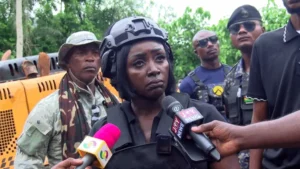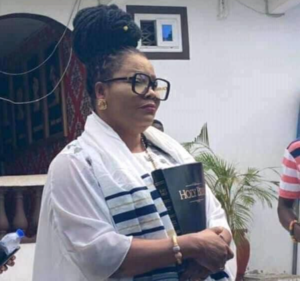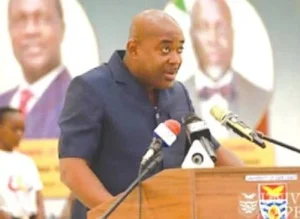
In its first gun attacks, suspected members of a separatist group seeking an independent state in eastern Ghana on Friday stormed two police stations freed cell inmates, and made away with ten assault rifles, a senior official said.
The bandits, according to reports, forcibly took over both police stations simultaneously, overpowered the police officers on duty, broke into the police armory, and made away with all the weapons belonging to the police.
“They naked the police officers on duty, took their weapons, and locked them in the cells before breaking into the armory,” an eyewitness stated.
Confirming the attack, the police administration in a communiqué said three of their men were also taken hostage during the attacks.
The Aveyime divisional commander, Supt. Denis Fiakpui had led his men to confront the attackers but they were subdued, disarmed, and shot in the process.
He and a driver were first rushed to the Battor Hospital in the North Tongu District and later taken to the police hospital for further treatment.
A military reinforcement team from the Agorta Naval base intervened and engaged the assailants at Tademe in a gunfight.
Volta Regional Minister Archibald Letsa said attackers — believed to be from the secessionist Homeland Study Group Foundation (HSGF) — launched the raids at dawn in the towns of Aveyime and Mepe in the Volta region.
“The security agencies are doing their best and we have to commend them… But for the effort and proactiveness of the security agencies, worse things would have happened.”
“We knew (they had a plan for last night] … They mentioned in their plan that there would be roadblocks but it wasn’t specified where the roadblocks would be but if you see their list of targets, and you want to prioritize as to which one to protect, obviously we took the right decision to protect very sensitive state installations,”
“The security is on top of the situation,” Dr. Letsa told the Press.
“We’re working to get the policemen released. It’s a critical situation we find ourselves right now.”
He said the separatists who want to establish a new nation of “Western Togoland” set up roadblocks at various entry points to the region, some 150 kilometers (95 miles) northeast of the capital Accra.
Eyewitnesses said the group hoisted flags and mounted signposts with the inscription “Western Togoland Restoration. We stand for our right”.
Car tyres were burned at the roadblocks.
One of the separatists told Newsmen the group was “seeking independence of our great motherland”.
“This is our land and we are taking over. Nothing will stop us,” the source said.
Travelers from the region reported major disruptions.
“We are currently stranded. We’ve been in traffic since 5 AM,” Linda Asante, a trader told The Hawk.
“Initially, we thought it was normal traffic until we realized the road has been blocked by this group.”
Ghana’s police warned road users were “likely to experience traffic due to security operations within those areas” and urged them to “exercise caution”.
Separatists began campaigning in the 1970s for a breakaway nation in the region they say has a unique history and culture.
The police and military in a joint statement also said security personnel had taken control of the highways and strategic installations within the Region in addition to foiling a plan by the Group to burn the Ho Central Market and other key installations.
Last November the group nominally declared independence for the territory.
That move followed a crackdown by the authorities last May that saw some of the group’s leaders arrested.
They were later released after treason charges were dropped against them by the Attorney General and Minister for Justice, Gloria Akufo.
In dropping the charges, the Attorney General filed a motion for ‘Nolle Prosequi’ to discontinue the trial.
The motion of Nolle Prosequi is usually filed when the charges cannot be proved, the evidence has demonstrated either innocence or a fatal flaw in the prosecution’s claim, or the prosecutor no longer thinks the accused is guilty.
Claims for independence have their roots in the region’s complex colonial history.
During the so-called “Scramble for Africa” in the 19th century, Britain seized much of what is today Ghana, while Germany grabbed neighboring Togo.
After Germany’s defeat in World War I, the land was split between British Togoland and French Togoland.
When Britain left its empire in Africa, British Togoland became part of eastern Ghana in 1956.
Ghana — viewed as one of West Africa’s most stable democracies — is gearing up for presidential elections in December.
The Volta region is a stronghold of the main opposition party, the National Democratic Congress, which is looking to unseat incumbent President Nana Addo Dankwa Akufo-Addo.






